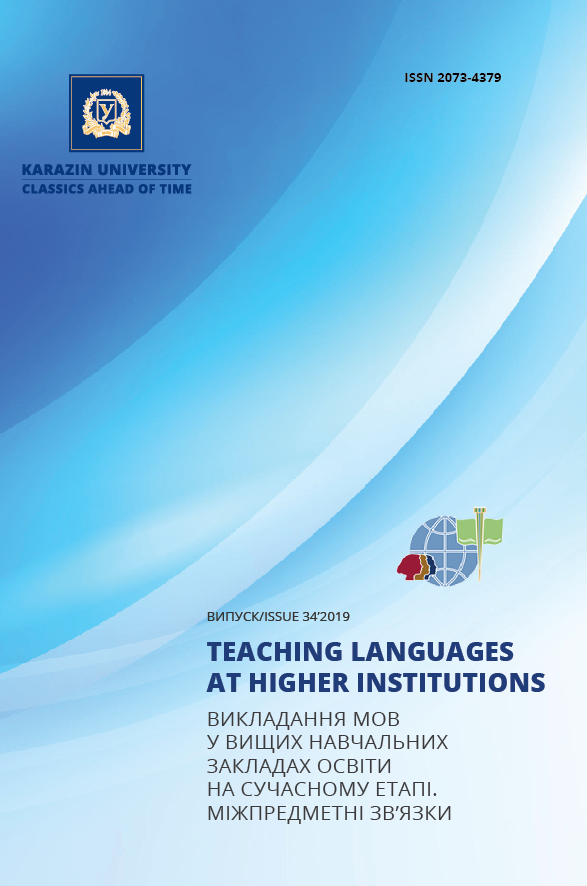Principles of using a computer game in teaching Business English to students of economic specialties at higher educational institutions of Ukraine
Abstract
This article examines the possibility of designing a computer game for Business English language teaching. In particular, the didactic potential of a computer game is investigated, the factors influencing the effectiveness of educational content mastering are determined. In addition, the main principles that should be taken into account for designing a computer game for Business English teaching are formulated according to the recent studies in the field of foreign language teaching methods, psychology and pedagogy. The first principle is to build a computer game in such a way as to provide for learners the flow experience that will help them to concentrate on an activity and enjoy it. The second principle is to provide a maximum learning autonomy that will encourage the development of critical thinking, strategic planning, and cooperation with other students. In such a way the pedagogical paradigm “the skills of XXI century” can be realized. The third principle is to ensure a sufficient cognitive load in a game-based learning environment that means that the level of a learning activity challenge should match to the skills of learners to stimulate their motivation. If the cognitive load is insufficient, students can get bored and lose interest in achieving in-game results as well as educational goals. If the cognitive load is too heavy, students can lose their motivation and leave the game. The important factor is that a computer game should provoke positive emotions and learning experience. The fourth principle is to design a computer game based on the modern theories of active learning presented by constructivist theory of learning, experiential learning, situated learning, problem-based learning. And the fifth principle is to make an educational computer game an entertaining one. This will help to involve more students and to keep them motivated.
Downloads
References
Admiral, W., Huizenga, J., Akkerman, S. and Dam, G.T. (2011). The concept of flow in collaborative game-based learning. Computers in human behavior, 27 (3), pp. 1185–1194 [in English].
All, A., Plovie, B., Castellar, E. and Looy, J. (2017). Pre-test influences on the effectiveness of digital-game based learning: a case study of a fire safety game. Computers in human behavior, 114, pp. 24–37 [in English].
Chang, C., Liang, C., Chou, P. and Lin, G. (2017). Is game-based learning better in flow experience and various types of cognitive load than non-game-based learning? Perspective from multimedia and media richness. Computers in human behavior, 71, pp. 218–227 [in English].
Csikszentmihalyi, M. (1996). Creativity: Flow and the psychology of discovery and invention. New York: HarperCollins [in English].
Kiili, K., de Freitas, S.D., Arnab, S. and Lainema, T. (2012). The design principles for flow experience in educational games. Procedia Computer Science, 15, pp. 78–91 [in English].
Misuraca, G. (2012). Envisioning digital Europe 2030: scenarios for ICT in future governance and policy modelling. European Foresight Platform [in English].
Razak, A., Connolly, T. and Hainey, T. (2011). The use of Game-Based Learning Within Curriculum for Excellence. Games-Based Learning. The 5thEuropean Conference. The National and Kapodistrian University of Athens, Greece, 20–21 October. UK: Academic Publishing Limited, p. 1 [in English].
Seidametova, Z.S., Ablyalimova. E.I., Medzhitova. L.M., Seitvelieva. S.N. and Temnenko. V.A. (2012). Cloud technologies and education. Simferopol: DIAIPI [in English].
Tarnopolsky, O., Kozhushko, S. and Zhevaga, V. (2006). Teaching / Learning Business English by doing business in English: emotional and self-assessment aspects. Part 1. Business Issues. Vol. 1. pp. 11–16 [in English].
Taylor, T.L. (2006). Play between worlds. Exploring online game culture. England, London: The MIT Press [in English].
Van Looy, J. (2010). Understanding computer game culture. Germany: Lambert Academic Publishing [in English].
Verhelst, N., Van Avermaet, P., Takala, S., Figueras, N. and North, B. (2009). Common European Framework of Reference for Languages: learning, teaching, assessment. Cambridge University Press [in English].

